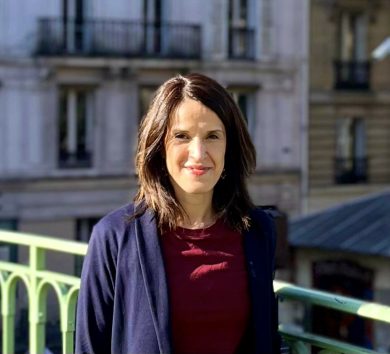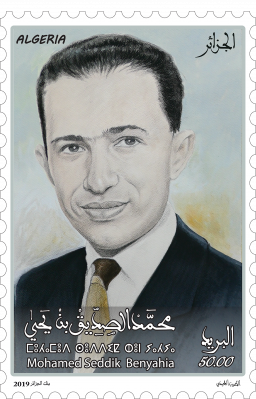 Dr. Muriam Davis is Associate Professor in the History Department at UC Santa Cruz. She is a 2023-2024 Humanities Institute Faculty Research Fellow, the Co-Principal Investigator for the “Vernaculars of Travel in South Asia and the Middle East” Research Cluster, and served as Faculty Co-Facilitator for the 2022 UCSC SSRC Dissertation Proposal Development Program. Dr. Davis is currently working on a book project which looks at the reconfiguration of the social sciences in Algeria after independence. This Winter, we spoke with Dr. Davis about how on-the-ground decolonization in Algeria affected the shape of sociology as a potentially revolutionary discipline, her recent archival research trip to Paris, and the importance of training graduate students in professional development skills such as grant-writing.
Dr. Muriam Davis is Associate Professor in the History Department at UC Santa Cruz. She is a 2023-2024 Humanities Institute Faculty Research Fellow, the Co-Principal Investigator for the “Vernaculars of Travel in South Asia and the Middle East” Research Cluster, and served as Faculty Co-Facilitator for the 2022 UCSC SSRC Dissertation Proposal Development Program. Dr. Davis is currently working on a book project which looks at the reconfiguration of the social sciences in Algeria after independence. This Winter, we spoke with Dr. Davis about how on-the-ground decolonization in Algeria affected the shape of sociology as a potentially revolutionary discipline, her recent archival research trip to Paris, and the importance of training graduate students in professional development skills such as grant-writing.
Hello Professor Davis! Thanks for chatting with us about your research and all the wonderful humanities work you’ve been involved in. Congratulations again on being named a 2023-2024 THI Faculty Research Fellow! To begin, could you give us a brief synopsis of your second book project, Algeria, Decolonization, and the French Social Sciences?
My pleasure! My second book project looks at the reconfiguration of the social sciences in Algeria after independence. After 1962, when French colonization officially ended in the country, Algerian academics and politicians sought to “decolonize” the university in a number of ways: this included training Algerian scholars, reflecting on the language of instruction (which had been in French), and also the colonial heritage of various disciplines such as anthropology, ethnography, and sociology. My second book project is interested in how the decolonization of knowledge – something that is often discussed – happened on the ground. In other words, I’m interested not only in the reform of higher education, but also how the boundaries among various fields of inquiry were reshaped by decolonization in Algeria.
You have said about Algeria, Decolonization, and the French Social Sciences that the project aims to explore and contextualize the relationship between the establishment of sociology as an intellectual discipline, and projects of North African nation-state building after independence. Can you say more about the ways sociology was positioned as a discipline that could “enable the construction of a revolutionary polity”?
One of the things I hope to do in this project is to chart the transformation of sociology from a tool of colonial domination to a field of study that offered the possibilities of deepening the country’s revolutionary aims.
Absolutely. I had studied French sociology for my first book project, which focused on colonial attempts to introduce economic development in Algeria during the War of Liberation (1954-1962) and wondered how decolonization and Third Worldism also shaped the kinds of research paradigms adopted by sociologists on both sides of the Mediterranean.
As many scholars have noted, the universalizing impulse of sociology was rooted in colonial history, something that is particularly clear in the works of the French founding fathers of sociology such as Auguste Comte or Emile Durkheim. Yet the first Bachelor’s degree in sociology was not offered in France or Algeria until the late 1950s, a period that was right in the middle of the Algerian War of Liberation. Indeed, one of the discoveries I made was that the work of Frantz Fanon was generally taken up by sociologists in Tunisia and Algeria, precisely at a time when his legacy was otherwise being marginalized in Algeria. I have a forthcoming piece on this that I’m very excited about.

Stamp commemorating Mohamed Seddik Benyahia (the Algerian Minister of Higher Education and Scientific Research from 1971 to 1977) that was issued in 2019. Image from the Algerian post office website.
One particularly striking example of the faith that revolutionary leaders had in the discipline of sociology is the speech of the Algerian Minister of Higher Education at the International Congress of Sociology that was held in Algiers in 1974. In his opening remarks, he proclaimed that sociology was a “privileged weapon in the liberation of people in the Third World.” At this same conference, he banned ethnology outright for “having participated in the colonial system.” One of the things I hope to do in this project is to chart the transformation of sociology from a tool of colonial domination to a field of study that offered the possibilities of deepening the country’s revolutionary aims. At the same time, of course, the questions that sociology tackled – of industrialization, agriculture, family composition, and economic development – were crucial in the construction of a nation-state after 132 years of colonial rule. But despite this bombastic rhetoric, what I am finding is that French influence in the domain of the social sciences was not erased with one fell swoop. Rather, the entanglements between Algerian and French knowledge production were more complicated than the term “decolonizing” might suggest.
As part of the research for your book, in the summer of 2023, you visited Paris to spend time working in the archives of Pierre Bourdieu. I imagine this archival research revealed a host of fascinating documents and histories, but was there a specific textual encounter or a specific moment of surprise, shock, awe, or understanding that stands out to you?
The first thing that was amazing about Bourdieu’s archives is that they are treated as a national treasure! You have to get authorization for each individual document and no photographs are authorized. In terms of content, however, the archives revealed a lot of information about the instruction of the social sciences in the first 15 years of Algerian independence (since Bourdieu continued to train Algerian students and run a research center after the war). It was really interesting to see the various Algerian intellectuals and politicians who wrote to Bourdieu because they were interested in how sociological knowledge could advance their projects, and also to read about some of the more mundane concerns that accompanied introducing sociology as a scholarly cursus – from questions about textbooks to the place of statistics and the organization of curriculum requirements.
You’ve participated in a number of Research Clusters in The Humanities Institute including “Race, Violence, Inequality, and the Anthropocene,” “Memory of Forgotten Wars,” and were also the Co-Principal Investigator for the “Vernaculars of Travel in South Asia and the Middle East” cluster. Why is it important for you to engage in this kind of interdisciplinary research collaboration? Could you share one discovery you made or perhaps an event you participated in during your time working in these clusters that felt particularly special to you?
These research clusters have been a really important in bringing graduate students and faculty in conversation. The ability to organize reading groups and dinners with colleagues from different disciplines with different regional specializations is really valuable. I think new kinds of collaboration become possible when we have a format for discussion that is less rigid that that of an academic talk followed by a Q&A session. In the case of the “Vernaculars of Travel” group, Nidhi Mahajan and myself worked to create synergies and curate conversations between scholars of the MENA region and those who work on South Asia. In many ways, the international conference on “Geographies of/and the indigenous” workshop, which brought together scholars who work on the MENA region and South Asia last March (mainly hosted by the CSAS), felt like a culmination of many of the more information discussions we had animated over the course of the year. Seeing graduate students and faculty interact regularly over meals, workshops, and talks really strengthened a sense of community at a time when many were feeling isolated after the COVID lockdowns.
In 2022, you served with Professor Deborah Gould as a Faculty Facilitator for the UCSC Social Science Research Council-Dissertation Proposal Development Program. In this role, you facilitated workshops with the graduate student fellows designed to prepare them for conducting dissertation research and writing funding proposals. What drew you to this position, and why is it important to provide humanities graduate students with this kind community, mentorship, and training?
While the SSRC program gave graduate students the nuts and bolts of how to write grant proposals, it also provided a cohort of students that were constantly engaged in peer review, and in helping one another with the seemingly interminable process of writing and re-writing.
So many of the skill sets that we need as academics are treated as if they are second nature and we should just instinctively know how to do them. This is especially the case with grant writing, which is a really strange genre of communicating your ideas. While the SSRC program gave graduate students the nuts and bolts of how to write grant proposals, it also provided a cohort of students that were constantly engaged in peer review, and in helping one another with the seemingly interminable process of writing and re-writing. This program also came with financial support for the students, which is so crucial and allowed them to make progress on the research required for these kinds of proposals.
The students not only got to know one another (and the Faculty Facilitators), but also the other faculty members who offered feedback on their proposals. Opening yourself up to this kind of critique and exchange can be a scary prospect, but ultimately we all learn so much from presenting our ideas to those outside our fields who might not have the same scholarly background as ourselves. By the end of the development program the students had developed a real sense of camaraderie in addition to very much improved grant proposals!
Banner Image: The 1974 International Congress on Sociology held in Algiers. Image from Muriam Davis’s private collection.